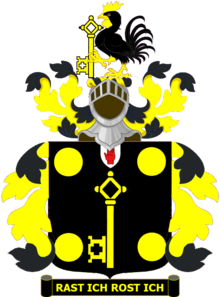Sir Frank Meyer, 2nd Baronet

Sir Frank Cecil Meyer, 2nd Baronet (7 May 1886 – 19 October 1935)[1][2] was a British businessman and Conservative Party politician.
Personal life
[edit]
The son of German-born businessman Sir Carl and Adele Meyer, Meyer was also successful in business, becoming vice-chairman of the De Beers diamond cartel.[1] He was educated at New College, Oxford and served in the First World War with the Essex Yeomanry and the Signal Corps, being mentioned in dispatches.[1][2] He was elected as MP for Great Yarmouth in 1924, but lost his seat in 1929. His son, Anthony Meyer, was also a Conservative MP. Anthony Meyer inherited his father's title at the age of fifteen when Frank Meyer died in a hunting accident at in Ayot St Lawrence, Hertfordshire.[1][3]
Career
[edit]
At the 1924 general election, he was elected as Member of Parliament (MP) for Great Yarmouth in Norfolk, defeating the Liberal MP Sir Arthur Harbord. Harbord retook the seat at the 1929 general election, and Meyer never re-entered Parliament.
Arms
[edit]
|
|
References
[edit]- ^ a b c d "Sir Frank Meyer". The Times (47200). London, England: Times Newspapers Limited: 16. 21 October 1935. Retrieved 27 February 2013.
- ^ a b "MEYER, Sir Frank Cecil". Who Was Who. Oxford University Press. December 2007. Retrieved 27 February 2013.
- ^ Roth, Andrew (8 January 2005). "Sir Anthony Meyer". The Guardian. London. Retrieved 27 February 2013.
- ^ Debrett's Peerage. 1936.
External links
[edit]
- 1886 births
- Territorial Force officers
- English people of German-Jewish descent
- Conservative Party (UK) MPs for English constituencies
- Meyer baronets
- UK MPs 1924–1929
- 1935 deaths
- Hunting accident deaths
- Alumni of New College, Oxford
- Politics of the Borough of Great Yarmouth
- Essex Yeomanry officers
- Jewish British politicians
- British Army personnel of World War I
- Royal Corps of Signals officers
- Accidental deaths in England
- Conservative MP for England, 1880s birth stubs
